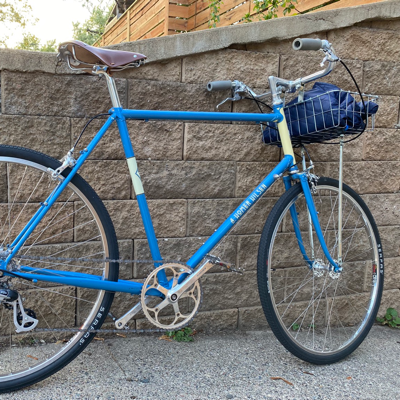A project I keep putting off is a solar power cart. Something that is the form factor of a hand truck, that I can wheel around my property, lift up into my pickup truck, etc. A solar panel on the “front” (that may unfold into a wider area but should fold up to approximately hand truck size), enough battery, charger, inverter etc. to:
- run a typical household refrigerator more or less indefinitely, maybe with enough power to spare to run an LED lamp for a couple hours a night.
- Do ANYTHING a standard wall socket can do for at least a few minutes. If I plug in something that draws 15 amps, it should deliver 15 amps, at least briefly. No instant brown-outs or popped breakers or magic smoke because ‘This outlet can only supply 5 amps and you just have to know that.’
Hurricanes, snow storms, tornadoes, dead trees, vehicle accidents and at least one Republican campaign rally down at the substation have taken my power down, and I’d like to just have the solution to that without dealing with gasoline in jerry cans. And most of the year I’d like to run power tools off-grid.
If you have a roof, use it. This is for poor apartment owners who aren’t allowed to install solar on their building roof
The $2,000 plug-in solar system installed on Dwyer’s backyard deck in March consists of two 400 watt panels, an inverter, a smart meter and a circuit breaker. It saves him around $35 per month on his power bill because he is consuming less energy from the grid, but he said reducing his carbon footprint was his primary motivation.
2000$ is insanely expensive. It will take forever to pay for itself at that price. You can buy a kit like this for 300€ in Germany which will give you 100% ROI after a year.
Hey, as someone in Germany do you have a link for this? I would absolutely love to buy something under a grand and pop it on my balcony.
OBI / Bauhaus / Aldi sometimes have sales for full kits
Obi has this one at the moment for example: https://www.obi.de/p/2191115656515/solakon-balkonkraftwerk-900w-800w-solaranlage-steckerfertig-komplettset-photovoltaik-anlage-800w-kabellaenge-5m
I have to add that i know the Growatt inverter(Wechselrichter) that ships with this kit and the monitoring it has really sucks. It does its job of generating electricity just fine however, so if you dont need monitoring or can build your own then it doesnt matter.
The built in monitoring with most inverters (expensive or not) is proprietary garbage that only works with the manufacturers app which is often some weird chinese app that wants location permissions. You have been warned :D
But yeah they are becoming insanely cheap. Last i checked you do not need to register a balkonkraftwerk with your electricity company or landlord up to 800W so that makes things very simple.
Edit: The app in question.

TIL I’m selling solar panels in Germany.
4 years and 9 months to even the cost.
Honestly, not bad. Better roi than I was expecting.
If he’s saving $35/mo with that system, I’ll eat a bug. .
In Germany it’s legal to back feed into your electrical system bypassing the need for a battery setup. In the US I don’t know of anywhere that’s legal.
Edit: I wasn’t clear that I’m talking about just plugging a system into the wall. I’m not referring to the relatively common practice of a professionally installed net metering setup. The difference is that a these smaller setups plug right in and do not require an electrician or arranging net metering with your company because you’d never produce more than you can use even at peak production hours. It’s a cost effective way to slow your meter down during peak production hours. Of course it’s more cost effective when you don’t buy the most expensive 400 watt system you can find.
Around here (Maryland) it is totally legal. You just need an interconnect that disconnects the panels from the grid when the grid goes down.
We actually have a system called net-metering, where the utility will buy electricity from residential customers at retail prices.
That’s not what this. This is plugging straight into the wall with a small system. Against code pretty much everywhere. What you’re talking about is only economically viable for large systems that will generate more than the owner can use at peak hours. These small systems are much cheaper, do not require an electrician, and won’t generate enough power to require a net metering setup. The owner will use all of the power it generates even at peak hours. It essentially will just slow their power meter down as they draw less from the grid. These small systems are very common in Europe these days because their regulations have kept up better than ours. Also their outlets in general are safer.
Obviously where this person is that’s legal, so there are exceptions. I assumed this setup involved a battery because they grossly overpaid for a 400 watt system.
If they’re not generating enough to backfeed even at peak, and they can detect when the power cuts off and deactivate until it comes back, is there an actual safety/legal issue?
To plug a solar panel into a wall socket with the intention of adding power to the electrical grid, you need an inverter. Solar panels generate DC, the grid is AC. It is possible to make an inverter that will synchronize to the grid, and if there’s on input waveform, it just won’t put out AC power. “Not grid-forming” is the term I’ve seen used for this.
If you go to harbor freight, buy a gas-powered generator, build a suicide cable and plug it into a socket in your house without throwing your main breaker, you could be energizing lines that a lineman somewhere thinks are not energized, which could injure or kill him.
Worse, by generating your own power you’re reducing the money you have to pay to the power company. That’s punishable by flaying in 14 states.
Mostly a code and legality issue. Local regulations just haven’t caught up in most places. Also there’s no rights for renters for this stuff just about everywhere in the US.
Okay, that makes more sense, thanks
Thats exactly whats being described here tho…
The price threw me, it’s just unbelievable that it’s that expensive for a battery-less 400 watt system. This moron got taken.
Yup, got ripped off hard. Are there import restrictions in the US that prevent people from buying dirrctly from china? Because most likely this 2000$ one is just a rebranded kit from China anyway.
Tariffs, of course. Trump is doing the fossil fuel industry’s bidding trying to kill all renewables.
Sure but even with 100% tariffs it would still be cheaper to import.
@unexposedhazard @roofuskit @technology I believe the tariffs on solar panels are 2000+%.
We are the first victims of American Imperialism.
Do you just not know or did you actually look into it?
Spoiler, but you just don’t know. It’s legal in every state.
However, most states do have anti-incentive because it’s corrupt as fuck. Not all states, but where “net metering” exists, they don’t actually pay you for power you generate. You only get a credit to your bill. The amount varies state to state, and they don’t allow you to apply it to bullshit fees and infrastructure cost that are passed along…
I calculated it and it amounts to 22.9% of what they would charge you.
My system is well over designed, and I produce way more power than I actually consume at peak. I am interconnected, but I refuse to send power back because there is zero point. They would not reduce the bare minimum bill that I have, which is just baseline fees they charge me for having my house connected. I don’t have a bill otherwise because I’m self sufficient for the most part.
I would run an extension cords to my neighbor’s houses before I send money back to this regional Monopoly. Therefore, I just leave the main disconnect off between me and the grid.
For reference, I have a 36 kW system with 100 kWh battery set up. The amount of power that I produce is based on the amount of power that I use, including to charge batteries. I average 125 kWh Daily production and my higher production days are about 160 to 170.
The point is to minimize the number or children who will die from the climate catastrophe.
Don’t be selfish.
I’m talking about just plugging into an outlet. What you’re talking about involves a hugely expensive electrician visit. With a small plug-in system you didn’t need to involve the company because you’re going to use everything you generate normally.
Welcome to America baybee!
Solar awnings should be a thing, honestly, awnings should just be a thing everywhere.
Awnings, Rolling Shutters, and an inner window insulated quilt shade. Really does wonder in all extreme temperatures.
We need a law protecting renters rights to install these and laws preventing home owner’s associations from Banning them
You just killed an electrician
Don’t they have grid-tie requirements? I support mandating that
Grid tie is different than just pluging power producing devices into an outlet. because that’s how people die
“This is an example of where technology is sort of ahead of the regulators,” Oliver said, adding: “As this rolls out to more of a nationwide product, we expect it will become more mainstream as people understand it better.”
Yeah, but those rules can’t come soon enough. As long as these things are safe by average folks to use, there shouldn’t be any other reason not to allow them.
Well, they’re going to have to legislate tying to the grid. And then they’re going to have to figure out how to manufacture an imbalance where the homeowner still owes them each month regardless of the reality. Once that’s sorted out I’m sure they’ll permit them. And let’s not forget a tax for not “spending as much on utilities” in there. Like, the astronomical extra money it was to register my hybrid because I wasn’t using the pump enough. So, once the fees, extortion tax, and manipulated imbalance protocols are worked out it will be smooth sailing right into “why even install these?”
The poor C-suite at that utility company already needs to find ever-increasing profits on a basically stable business model and now consumers can just precipitate electricity out thin air? That’s moving things in the wrong direction! Thank goodness they basically own our local government and shareholder value can be maintained.
Fuck trump, the traitor cunt. I hope his end is miserable.
Lots of these things already in Germany.
I used to work for a company that had these in their portfolio. Granted, this was over 10 years ago, but at that time, the fact that each panel had their own micro inverter, reduced the efficiency quite a bit. Maybe things have changed.
I my case, the balcony is in the least sunny facade, so I’d have to hang them from window sills, and the homeowners association would probably give me hell about them.











